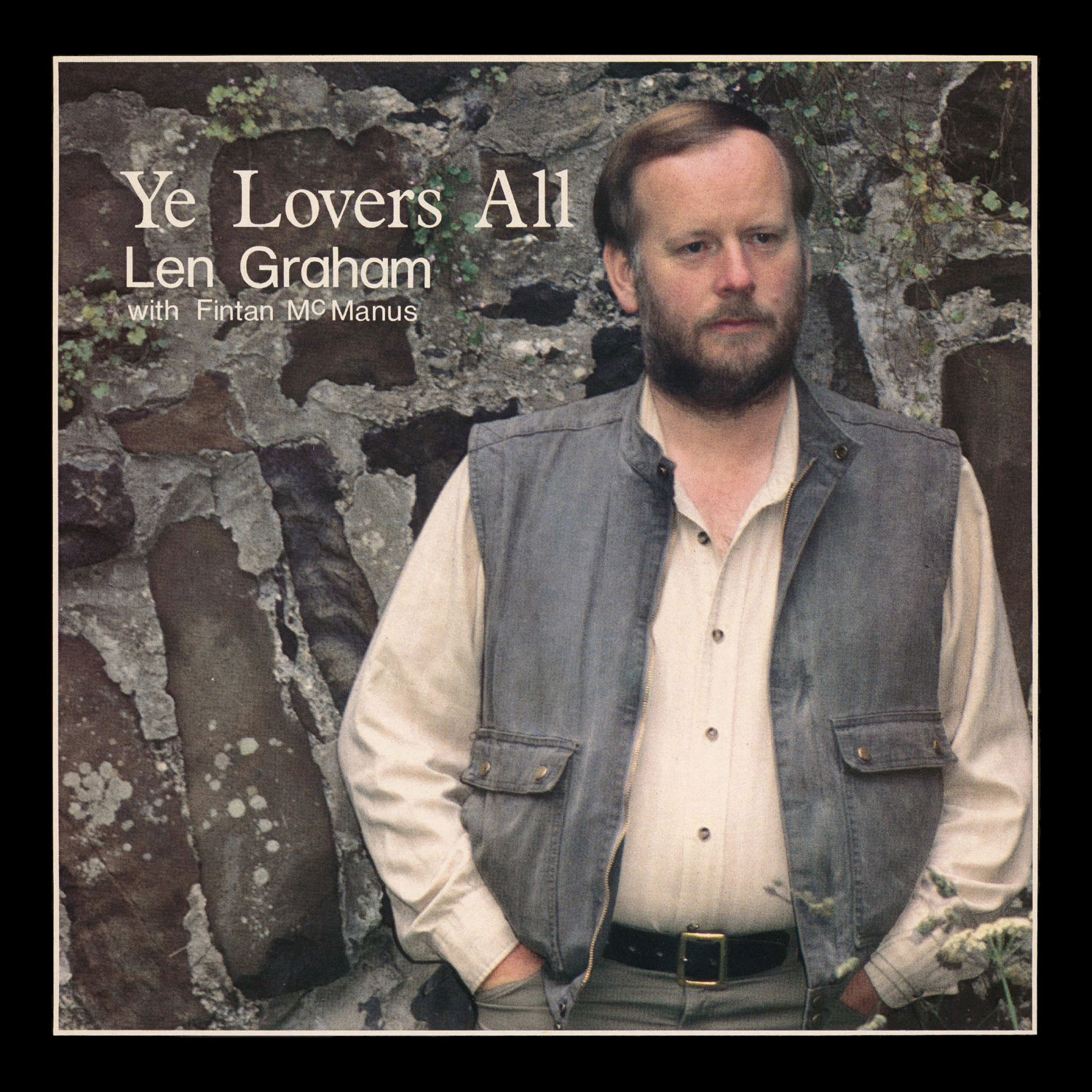

Sleeve Notes
'Ye Lovers All' is Len Graham's fifth album and his second on the Claddagh label. The songs and ballads are a celebration of love under its many different guises.
When I Was a Bachelor — This is a song of disillusionment with marriage which I learned from the late Joe McKeever of Brockaghbuoy, County Derry. The reel that follows is called Mary McMahon from Drummuck.
Lovely Ann — I first heard this song from Barney McManus of Torbraden, County Fermanagh, some fifteen years ago. I was delighted recently to hear another version from Fintan's mother, Rose McManus of Corradiller, County Fermanagh. I sing Rose's version here.
The Crockery Ware — Eddie Butcher of Magilligan, County Derry, who died in 1980, sang a fragment of this song but the version here is from the late Oliver John Abbott of Ontario, Canada. O. J. Abbott emigrated from England to Canada in 1884. He worked on the farms and in the lumbercamps of Ontario where he learned many songs. Much of his repertoire consisted of Irish songs, many of them coming from Mrs. O'Malley, the wife of one of his employers. O. J. Abbott died in 1962 aged 90.
I borrowed a couple of verses from Frank Purslow's Marrowbones to complete this story of an over-eager lover on a night visit. Alas, the 'crockery ware' or chamber pot is the cause of his downfall.
The Rushes Green — Although not a literal translation, this would appear to be a version of the song in Irish An Binsín Luachra (The Little Bunch of Rushes). Valerie McManus of Aughkillymaude, County Fermanagh, gave me this song.
The Green Garters — A song about 'six-timing' and its consequences, which came from Malachy Clerkin of Threemilehouse, County Monaghan. I substituted Malachy's air for one I heard the late Richard Hayward of Belfast sing to The Bonny Wee Window.
Ye Lovers All — I learned this song from Marie McEntee of Threemilehouse, County Monaghan. I understand it refers to Ballyronan in County Derry, close to the shore of Lough Neagh.
True Lover John — This is the first song that I heard sung by Joe Holmes of Ballymoney, County Antrim who died in 1978. It is a version of the ballad The Grey Cock (Child no. 248) and it also appears in the 'Songs of the People' as no. 699. The crowing of the cock at dawn brings an untimely end to the lover's 'night visit'.
The Lass of Glenshee — Barney McManus was the first person I heard sing this song and, later, I learned another version from Eddie Butcher. The St. Johnston mentioned in this song is not that in County Donegal but St. Johnstoun, the former name for Perth, Scotland and it is in Perthshire that Glenshee is to be found. According to John Ord's 'Bothy Songs and Ballads' (Alex Gardner, Paisley, 1930) it was composed by Andrew Sharp, a Perth shoemaker, who died in 1817. It appears in the 'Songs of the People' under no. 590.
The Lass from Killiecrankie Monytnusk — These two highland schottisches I learned from Joe Holmes. Joe could only recall the words to one verse of' The Lass from Killiecrankie. I have used Joe's words as verse one and the other two verses were learned from John Moulden of Portrush, County Antrim who in turn had them from Willie Davis of Belfast. I sing the song to Joe's air.
Killiecrankie and Monymusk are in Perthshire. Daniel Dow (1732-1783) born in Kirkmichael, Perthshire composed Sir Archibald Grant of Monemusk which later became simply abbreviated to Monymusk.
Kane's Shady Glen — This is a relatively recent song, which was composed by Francis Heaney (1845-1933) of Magherabuoy, County Derry. His niece Sarah Heaney sang me this and others of his fine compositions. It appears as no. 538 in the 'Songs of the People'.
The land of Ó Catháin mention in the first line of this song is a reference to an area of County Derry formerly ruled by the Ó Catháin sept. Kane is an anglicisation of Ó Catháin.
The Frog's Wedding — The story of' The Frog and the Mouse' has for Centuries been sung to children the world over and appeals to singers of all ages. A ballad entitled A Moste Strange Weddinge of the Ffroge and the Mowse was entered in the register of the Company of Stationers of London by Edward White on November 21st 1580. This version is from Packie Manus Byrne of Corkermore, County Donegal.
Sweet William's Ghost — Sandy McConnell of Bellanaleck, County Fermanagh, was my source for this version of Sweet William's Ghost. It appears as no. 77 in the Child collection. Sweet William is dead and he visits his lover in ghostly form. As the cock crows the troth is returned and only then does William's soul find rest.
The Whiskey Song — This is a rollicking song about our national beverage — it is another given to me by Fintan's mother, Rose McManus.
Len Graham
All references to the 'Songs of the People' are to the Sam Henry Collection published in The Northern Constitution 1923-1939. All references to Child are to 'English and Scottish Popular Ballads' 1882-1898, edited by Francis James Child.